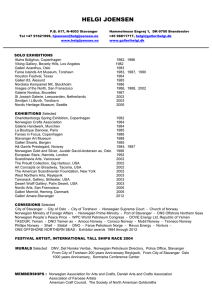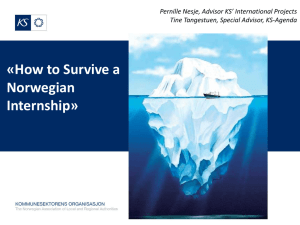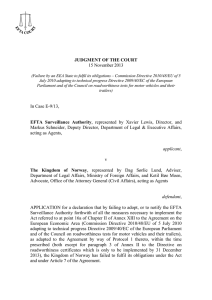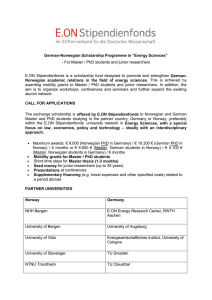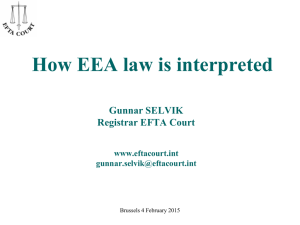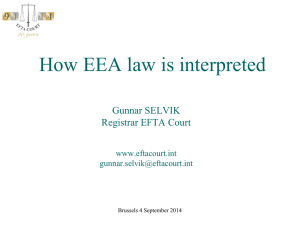JUDGMENT OF THE COURT 24 September 2014 In
advertisement
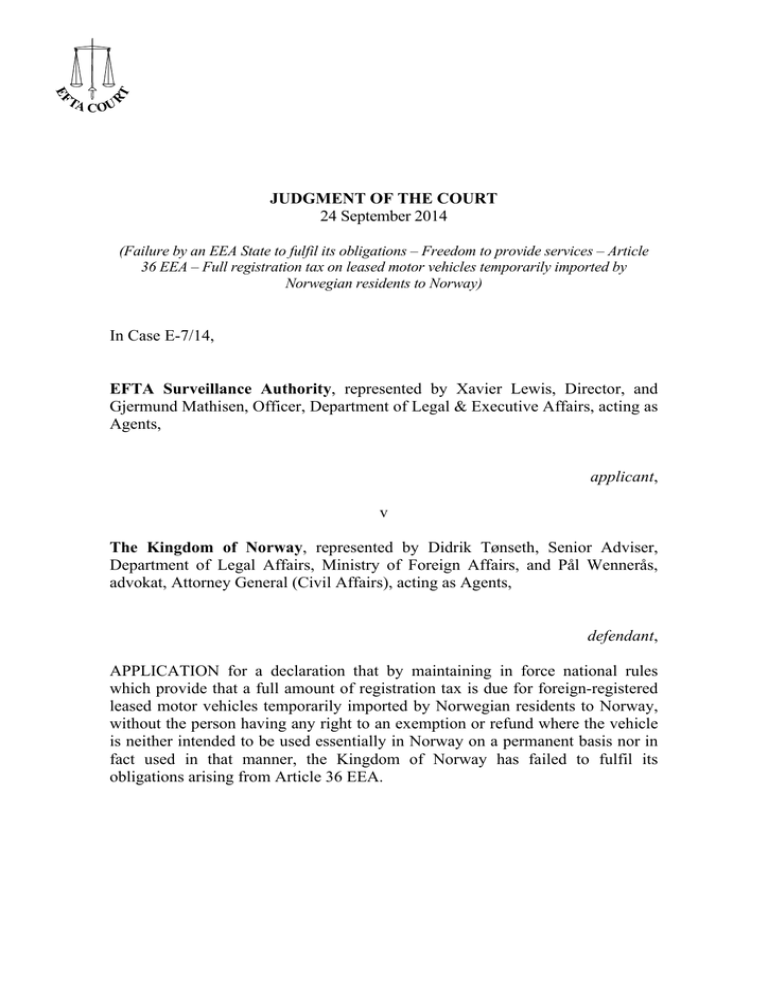
JUDGMENT OF THE COURT 24 September 2014 (Failure by an EEA State to fulfil its obligations – Freedom to provide services – Article 36 EEA – Full registration tax on leased motor vehicles temporarily imported by Norwegian residents to Norway) In Case E-7/14, EFTA Surveillance Authority, represented by Xavier Lewis, Director, and Gjermund Mathisen, Officer, Department of Legal & Executive Affairs, acting as Agents, applicant, v The Kingdom of Norway, represented by Didrik Tønseth, Senior Adviser, Department of Legal Affairs, Ministry of Foreign Affairs, and Pål Wennerås, advokat, Attorney General (Civil Affairs), acting as Agents, defendant, APPLICATION for a declaration that by maintaining in force national rules which provide that a full amount of registration tax is due for foreign-registered leased motor vehicles temporarily imported by Norwegian residents to Norway, without the person having any right to an exemption or refund where the vehicle is neither intended to be used essentially in Norway on a permanent basis nor in fact used in that manner, the Kingdom of Norway has failed to fulfil its obligations arising from Article 36 EEA. –2– THE COURT, composed of: Carl Baudenbacher, President, Per Christiansen and Páll Hreinsson (Judge-Rapporteur), Judges, Registrar: Gunnar Selvik, having regard to the written pleadings of the parties and the written observations of the European Commission, having decided to dispense with the oral procedure, gives the following Judgment I Introduction 1 By an application lodged at the Court on 14 January 2014, the EFTA Surveillance Authority (“ESA”) brought an action under the second paragraph of Article 31 of the Agreement between the EFTA States on the Establishment of a Surveillance Authority and a Court of Justice (“SCA”) seeking a declaration from the Court that by maintaining in force national rules which provide that a full amount of registration tax is due for foreign-registered leased motor vehicles temporarily imported by Norwegian residents to Norway, without the person having any right to an exemption or refund where the vehicle is neither intended to be used essentially in Norway on a permanent basis nor in fact used in that manner, the Kingdom of Norway has failed to fulfil its obligations arising from Article 36 EEA. 2 ESA took the view that the Norwegian legislation is contrary to the free movement of services. The charge of a full registration tax is likely to hinder Norwegian residents from using leased car services offered by companies established in other EEA States and to hinder the latter from offering their services to Norwegian residents. A full registration tax could only be justified in cases where a person permanently resident in Norway would lease a vehicle from a company established in another EEA State and the duration of the leasing contract would cover approximately the entire economic life of the vehicle. II Law EEA law 3 Article 36(1) EEA reads: Within the framework of the provisions of this Agreement, there shall be no restrictions on freedom to provide services within the territory of the Contracting Parties in respect of nationals of EC Member States and EFTA States who are –3– established in an EC Member State or an EFTA State other than that of the person for whom the services are intended. 4 Article 31 SCA reads: If the EFTA Surveillance Authority considers that an EFTA State has failed to fulfil an obligation under the EEA Agreement or of this Agreement, it shall, unless otherwise provided for in this Agreement, deliver a reasoned opinion on the matter after giving the State concerned the opportunity to submit its observations. If the State concerned does not comply with the opinion within the period laid down by the EFTA Surveillance Authority, the latter may bring the matter before the EFTA Court. National law 5 Section 15 of the Act of 18 June 1965 No 4 on road traffic (lov 18. juni 1965 nr. 4 om vegtrafikk, “The Road Traffic Act”) reads: Motor vehicles shall be registered. The Ministry adopts further provisions on such public registration of motor vehicles … 6 Section 1 of the Act of 19 May 1933 No 11 on Excises (lov 19. mai 1933 nr. 11 om særavgifter, “The Excise Act”) reads: When Parliament with reference to the present Act adopts special charges for the public purse that are not subject to other Acts, the Ministry adopts further provisions on the calculation and control. 7 Section 1(1) of the Act of 19 June 1959 No 2 on taxes for motor vehicles and boats (lov 19. juni 1959 nr. 2 om avgifter vedrørende motorkjøretøyer og båter, “The Motor Vehicle and Boat Tax Act”) reads: When Parliament with reference to the present Act adopts special charges for the public purse that are not subject to other Acts, the Ministry adopts further provisions on the calculation and control. 8 Section 1-1 of Regulation of 19 March 2001 No 268 on registration tax for motor vehicles (forskrift 19. mars 2001 nr. 268 om engangsavgift på motorvogner, “The Motor Vehicle Registration Tax Regulation”) reads: The present regulation concerns the calculation and control of the registration tax for motor vehicles that are subject to charges pursuant to Parliament’s decision on registration tax on motor vehicles, etc. 9 The Norwegian Parliament adopts for every budget year a decision imposing special charges, inter alia, on owners of motor vehicles in accordance with Section 75(a) of the Norwegian Constitution. The legal framework for –4– implementing the decision follows from Section 1 of the Excise Act, Section 1(1) of the Motor Vehicle and Boat Tax Act, and Section 1-1 of the Motor Vehicle Registration Tax Regulation. 10 An exemption is made for foreign-registered rental cars, but not leased cars, as is clear from Section 1, paragraph 4 and Section 5(c) of Regulation of 20 June 1991 No 381 on the exemption from import duties and taxes for importation and temporary use of foreign-registered motor vehicles (forskrift 20. juni 1991 nr. 381 om avgiftsfri innførsel og midlertidig bruk av utenlandskregistrert motorkjøretøy i Norge, “The Motor Vehicle Import Tax Exemption Regulation”). 11 Section 1, paragraph 4, of the Motor Vehicle Import Tax Exemption Regulation reads: For the purpose of this regulation, a rental motor vehicle is a vehicle that is put at the disposal of the lessee for a certain amount of time in relation to a professional business activity and against remuneration. In case the rental agreement includes a purchasing option, the vehicle will not be considered a rental motor vehicle. 12 Section 2, paragraphs 1 and 2, of the Motor Vehicle Import Tax Exemption Regulation reads: Main rule Tax-free import and temporary use of a foreign-registered motor vehicle in Norway is allowed for persons with permanent residence in another country, in accordance with Section 3. The same right for import and use is granted to persons that have temporary residence in Norway in accordance with Section 4 or that have access to such import and use in accordance with the provisions laid down in the present regulation, in accordance with Section 5. 13 Section 5(c), paragraphs 1 and 4, of the Motor Vehicle Import Tax Exemption Regulation reads: Rental motor vehicles A person with permanent residence in Norway may import and temporarily use a foreign registered rental motor vehicle in Norway. The total use in accordance with this provision may not exceed 42 days within a 12-months period. … A foreign-registered rental motor vehicle cannot be used in Norway by persons with permanent residence in Norway in accordance with this provision for more than 182 days within a 12-months period. –5– 14 Section 5(i) of the Motor Vehicle Import Tax Exemption Regulation reads: Company cars The regional customs office may grant a worker or a self-employed person who is permanently residing in Norway permission to use a specified foreignregistered motor vehicle if such is provided by an employer or a client established in another EEA State. A condition for such a permission is that the vehicle must be necessary for the performance of professional duties or assignments, and, furthermore, the motor vehicle may not be used essentially and permanently in Norway. The motor vehicle will be considered to have been used essentially and permanently in Norway when it is used in Norway for 183 days or more within a 12-months period, and when, within the same 12-months period, it is used to a greater extent for private and business purposes in Norway rather than for business purposes abroad, measured in amount of kilometres. III Facts and pre-litigation procedure 15 By letter dated 12 August 2009, ESA informed the Norwegian Government that it had received a complaint on 5 August 2009 regarding the Norwegian rules of registration taxation on the temporary import and use of foreign-registered leased or hired cars by persons permanently resident in Norway. 16 The case was the subject of various discussions with the Norwegian authorities, in which the national legal framework was clarified and possible amendments were explored. In this connection, the necessary amendments to the relevant national rules came into place as regards rental cars. With respect to leased cars, however, the issue remained. 17 On 21 March 2012, ESA issued a letter of formal notice since foreign-registered leased cars temporarily imported by Norwegian residents to Norway remained subject to the full registration tax from the moment they were used in Norway, regardless of their intended or de facto use in Norway, unless the importer had obtained the special permission for company cars in accordance with Section 5(i)of Regulation of 20 June 1991 No 381. 18 ESA argued that the Norwegian legislation was not in line with the free movement of services and concluded that Norway had failed to fulfil its obligations arising from Article 36 EEA. 19 By letter of 23 May 2012, the Norwegian Government replied to the letter of formal notice, acknowledging that the Norwegian system might be in conflict with the obligations arising from Article 36 EEA. The Norwegian Government informed ESA that it had invited the Norwegian Customs and Excise Directorate (“the Directorate”) to examine the case and to present possible amendments. –6– 20 On 11 June 2012, ESA sent a letter to the Norwegian Government inviting it to present a timetable for the adoption of the necessary amendments to the relevant legislation in order to ensure its compatibility with the EEA Agreement. 21 By letter of 29 June 2012, the Norwegian Government replied to ESA that it had given the Directorate until 15 October 2012 to formulate an opinion on the matter and to make proposals for amendment. Those amendments were to be presented to the Norwegian Parliament for approval, and it was, therefore, not possible to establish, at that time, a timetable for adoption. 22 Having received no further information from the Norwegian Government, ESA delivered a reasoned opinion to Norway on 21 November 2012, maintaining the conclusion of its letter of formal notice. ESA required Norway to take the measures necessary to comply with the reasoned opinion within two months following notification thereof. 23 In its observations of 21 February 2013 on ESA’s reasoned opinion, the Norwegian Government stated it had already acknowledged that the Norwegian system might be in conflict with the obligations arising from Article 36 EEA. The Norwegian Government also informed ESA that it was planning to adopt, in May 2013, a proposal for legislative changes, due to be sent to Parliament in October 2013. Final adoption and entry into force was scheduled to take place by l January 2014. 24 By letter of 4 July 2013, the Norwegian Government announced that it would not be able to adhere to its timeline and informed ESA that a new system was scheduled to enter into force by 1 January 2015. 25 ESA decided, therefore, to bring the matter before the Court pursuant to Article 31(2) SCA. IV Procedure before the Court and forms of order sought 26 ESA lodged the present application at the Court on 14 January 2014. The statement of defence from Norway was received on 3 April 2014. On 22 April 2014, ESA, by way of a fax, waived its right to submit a reply. 27 The applicant, ESA, requests the Court to: 1. Declare that by maintaining in force national rules which provide that a full amount of registration tax is due for foreign-registered leased motor vehicles temporarily imported by Norwegian residents to Norway, without the person having any right to an exemption or refund where the vehicle is neither intended to be used essentially in Norway on a permanent basis nor in fact used in that manner, Norway has failed to fulfil its obligations arising from Article 36 of the EEA Agreement. 2. Order the Kingdom of Norway to bear the costs of these proceedings. –7– 28 The defendant, Norway, accepts ESA’s claim that it has failed to fulfil its obligations arising from Article 36 EEA and requests the Court to declare the application to be founded. 29 After having received the express consent of the parties, the Court, acting on a report from the Judge-Rapporteur, decided to dispense with the oral procedure in accordance with Article 41(2) of the Rules of Procedure (“RoP”). V Findings of the Court 30 Article 3 EEA imposes upon the Contracting Parties the general obligation to take all appropriate measures, whether general or particular, to ensure fulfilment of the obligations arising out of the EEA Agreement (see, inter alia, Case E-18/13 ESA v Iceland [2013] EFTA Ct. Rep. 962, paragraph 14, and the case law cited). 31 The question of whether an EFTA State has failed to fulfil its obligations must be determined by reference to the situation in that State as it stood at the end of the period laid down in the reasoned opinion (see, inter alia, ESA v Iceland, cited above, paragraph 16, and the case law cited). 32 Article 36 EEA precludes the application of any national legislation which, without objective justification, impedes a provider of services from actually exercising that freedom or which have the effect of making the provision of services between EEA States more difficult than the provision of services purely within one EEA State (compare, to that effect, order in Case C-242/05 van de Coevering [2006] ECR I-5843, paragraphs 19 and 20, and case law cited). 33 In the present case, it is undisputed that where a Norwegian resident leases a motor vehicle from a lessor resident in Norway, that vehicle will normally be registered in Norway and the registration tax will already have been paid. Conversely, where a Norwegian resident leases a motor vehicle from a nonresident lessor, he must register the vehicle in Norway and pay the registration tax. In the case of the short-term lease of a vehicle for a non-resident lessor, generally for a period which is shorter than the useful life of the vehicle, the economic burden of the tax will be concentrated on the period of the lease. 34 By doing so, the Norwegian legislation dissuades Norwegian residents from using leased car services offered by companies established in other EEA States and those companies from offering their services to Norwegian residents. Since the obligation to pay the registration tax in the full amount has the effect of making cross-border leasing activities more difficult, it constitutes a barrier to the freedom to provide services (compare, to that effect, van de Coevering, cited above, paragraph 21). 35 Such a measure is admissible only as a derogation expressly provided for by Article 33 EEA, cf. Article 39 EEA, or if justified by overriding reasons in the general interest. Even in such a case, however, the application of that derogation –8– must be able to secure the attainment of the objective which it pursues and must not go beyond what is necessary to attain that objective (see, to that effect, van de Coevering, cited above, paragraph 22, and the case law cited). 36 The Court notes that the EEA Agreement does not set out any rules on the taxation of motor vehicles that are applicable to this case. Thus, the EEA States are free to exercise their powers of taxation in that area, provided they comply with EEA rules (see Case E-14/13 ESA v Iceland [2013] EFTA Ct. Rep. 924, paragraph 25 and Case E-7/07 Seabrokers [2008] EFTA Ct. Rep. 172, paragraph 48; compare, to that effect, van de Coevering, cited above, paragraph 23). 37 Accordingly, an EEA State may levy a registration tax on a vehicle made available to a person residing in that State by a company established in another EEA State when that vehicle is intended to be used essentially in the first EEA State on a permanent basis or is in fact used in that way. If this condition is not satisfied, the connection with an EEA State of the vehicle registered in another EEA State is weaker, so that another justification for the restriction in question is necessary (compare, to that effect, van de Coevering, cited above, paragraphs 24 and 26, and case law cited). 38 However, even if the imposition of such a tax were to serve a general interest, it is also necessary for the tax to comply with the principle of proportionality. Accordingly,, the national rules at issue in the present case, which provide that a full amount of registration tax is due for foreign-registered motor vehicles temporarily imported by Norwegian residents to Norway, are contrary to the principle of proportionality in so far as the aim they pursue can be achieved by introducing a tax proportionate to the duration of the registration of the vehicle in the State where it is used, which would ensure no discrimination with respect to amortisation of the tax against vehicle leasing undertakings established in other EEA States (compare, to that effect, van de Coevering, cited above, paragraph 27). 39 It must therefore be held that, by maintaining in force national rules which provide that a full amount of registration tax is due for foreign-registered leased motor vehicles temporarily imported by Norwegian residents to Norway, without the person having any right to an exemption or refund where the vehicle is neither intended to be used essentially in Norway on a permanent basis nor in fact used in that manner, Norway has failed to fulfil its obligations arising from Article 36 EEA. VI 40 Costs Under Article 66(2) RoP, the unsuccessful party is to be ordered to pay the costs if they have been applied for in the successful party’s pleadings. Since the EFTA Surveillance Authority has requested that Norway be ordered to pay the costs, and the latter has been unsuccessful, and since none of the exceptions in Article 66(3) apply, Norway must be ordered to pay the costs. –9– On those grounds, THE COURT hereby: 1. Declares that by maintaining in force national rules which provide that a full amount of registration tax is due for foreignregistered leased motor vehicles temporarily imported by Norwegian residents to Norway, without the person having any right to an exemption or refund where the vehicle is neither intended to be used essentially in Norway on a permanent basis nor in fact used in that manner, the Kingdom of Norway has failed to fulfil its obligations arising from Article 36 EEA. 2. Orders the Kingdom of Norway to bear the costs of the proceedings. Carl Baudenbacher Per Christiansen Páll Hreinsson Delivered in open court in Luxembourg on 24 September 2014. Gunnar Selvik Registrar Carl Baudenbacher President

